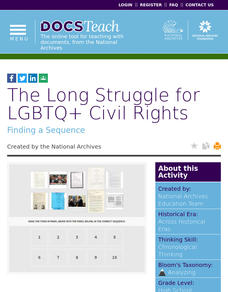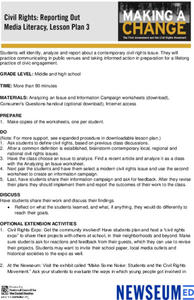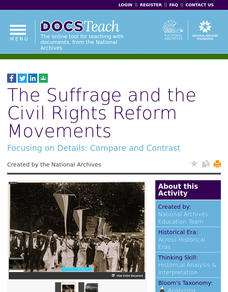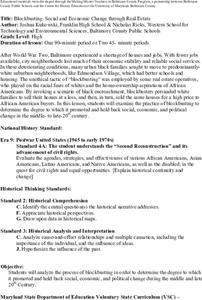K20 LEARN
Plessy v. Ferguson: An Individual's Response to Oppression
After generating research questions rated to segregation, groups are given a primary source document (Jim Crow Laws, Black Codes, Plessy v. Ferguson, etc.) and craft a presentation that details the key elements of their assigned...
K20 LEARN
Forgotten Figures: The Civil Rights Movement
Most have heard of Dr. Martin Luther King, Malcolm X, and Rosa Parks, but few recall Elizabeth Jennings, Samuel W. Tucker, or Ada Lois Sipuel Fisher. Young historians research and then develop a presentation about the contributions of...
Newseum
Civil Rights: Turning Points
As part of a civil rights movement study, groups select an event from an interactive timeline that they feel marks a turning point in the struggle. After collecting evidence to support their choice, the teams develop a multimedia...
Newseum
Making a Change: Letter From Birmingham Jail
Martin Luther King Jr.'s "Letter From Birmingham Jail" was written in response to "A Call for Unity," written by eight white ministers from Birmingham and published in the local newspaper. After reading both letters and following a list...
DocsTeach
The Long Struggle for LGBTQ+ Civil Rights
Academics analyze 10 primary documents and photos to create a timeline of the LQBTQ+ movement. The activity includes an online worksheet. Scholars also participate in a group discussion to understand the long struggle the LGBTQ+...
DocsTeach
The 19th Amendment and the Road to Universal Suffrage
Your vote matters! An informative activity focuses on the Nineteenth Amendment and explains how it paved the way for universal voting rights. Young historians analyze several documents and a complete a worksheet, describing the impact of...
Newseum
Civil Rights: Reporting Out
After brainstorming a list of contemporary local, regional, and national civil rights issues, pairs of scholars select one of these issues and design an information campaign to spread awareness of the issue.
Newseum
'The Press and the Civil Rights Movement' Video Lesson
Scholars watch a video featuring journalists who covered the civil rights movement, then respond to questions on a viewing guide. The video features interviews with participants and original news footage from the 1950s and 1960s. In...
Newseum
Civil Rights: Chronicling the Movement
Scholars investigate events in the civil rights era in their community and develop a multimedia presentation of their findings. They compare local events with national events discussed on a NewseumED timeline.
Newseum
Civil Rights News Coverage: Looking Back at Bias
Not all southern newspapers covered the civil rights movement of the 1950s and 1960s. Young journalists investigate how The Lexington (Ky. Herald-Leader and The Jackson (Tenn.) Sun re-examined their coverage of the movement. After...
Newseum
The Freedom to Make a Change
As part of a study of the First Amendment, young historians research instances when individuals or groups used the First Amendment to change the United State's laws or policies. Teams are each assigned a different case study. With the...
Newseum
Civil Rights: Your Stories of Change
Young activists examine local civil rights issues presented in news media sites to determine what elements make these stories attention-grabbing and trustworthy. Using this information and their worksheets from the first two lessons in...
Newseum
Civil Rights: The Five Freedoms
After a close reading of the First Amendment and the five freedoms it guarantees, class members examine the civil rights timeline to see how civil rights groups applied these freedoms to create change. Using the issue the class chose in...
Newseum
Civil Rights: Identifying Community Issues
As part of the social, economic, and legal/political civil rights study, class members brainstorm a list of current civil rights issues that affect their community. Individuals or pairs select one issue to research further. The class...
DocsTeach
The Suffrage and the Civil Rights Reform Movements
It's the American way to put one foot in front of the other and march. Using images of protests from the civil rights and women's suffrage movements, young historians analyze similarities between the two watershed moments of social...
DocsTeach
The Path of Justice: Selma and the Voting Rights Act
The civil rights movement: An ongoing battle for change. The activity focuses on President Johnson's speech in response to the massacre at the Selma March. Academics study the speech, complete a hands-on-activity, and discuss President...
DocsTeach
The Impact of Bloody Sunday in Selma
Who is to blame when a peaceful protest turns deadly? Scholars research the impact of the civil rights march in Selma, better known as Bloody Sunday. The activity uses files from the FBI's investigation to help academics understand the...
DocsTeach
The Civil Rights Act of 1964 and the Equal Employment Opportunity Commission
1964: A victory for the civil rights movement! Scholars read a section of the Civil Rights Act of 1964 and discuss what affirmative actions means to them. The resource is a jigsaw activity, with each group focusing on one section of the...
DocsTeach
Responding to the Murder of Harry T. Moore
Heroic civil rights leader Harry T. Moore is murdered! An eye-opening activity delves into the past to understand the murder of prominent civil rights leader and educator Harry Moore and his wife. Academics also read President Truman's...
DocsTeach
Martin Luther King, Jr. and the Fight for Civil Rights
Find clues to the past with photos! Young historians use a photo from one of Martin Luther King Jr.'s peaceful protests to practice photo analysis. Academics look at the image to gain clues about what is happening and why. To finish,...
DocsTeach
We Shall Overcome: March on Washington
Unlike most children, Edith Lee-Payne of Detroit went to the March on Washington with her mother to celebrate her 12th birthday. Pupils walk the march with her by analyzing a closeup image of her that has come to represent the pivotal...
Center for History Education
African Americans and the Democratic Party
Why did African American voters switch from the Republican Party to the Democratic party during the Depression Era? That is the question young historians attempt to answer as they study primary source documents from the period. The focus...
Center for History Education
Contextualizing a Historical Photograph: Busing and the Anti-busing Movement in Boston
The anti-busing movement in Boston is the focus of a lesson that asks young historians to examine primary source documents to identify the causes and consequences of busing pupils from one area of the city to another in the attempt to...
Center for History Education
Blockbusting: Social and Economic Change through Real Estate
"Redlining," "Blockbusting," and "White Flight" may not be terms familiar to young historians. Here's a lesson that introduces middle schoolers to these terms and the actions associated with them. Class members examine a series of...

























